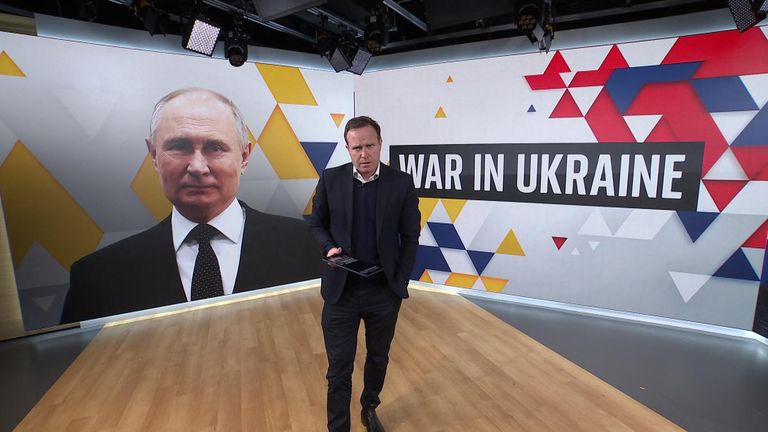There is a “possibility” that G7 nations will support Ukraine’s war effort through the use of billions of dollars in loans linked to seized Russian assets, the US Treasury secretary has told Sky News.
In a wide-ranging interview with Sky’s Wilfred Frost, Janet Yellen said she was hopeful of a “united front” on the issue ahead of a key meeting of finance ministers in Italy, arguing that Ukraine had “substantial needs”.
Ukraine war latest:
Putin sacks minister in new sign of shift in strategy
She also admitted there was a possibility that China could respond to the imposition of US sanctions on its sprawling green economy last week, hitting out at “massive Chinese overcapacity” in markets for things like solar panels and electric cars.
Ms Yellen said she would not weigh in on the looming UK general election, but added, generally, that she “always loved” seeing women achieve high offices in politics and economics.
It was a reference to the possibility that Labour’s Rachel Reeves could become the UK’s first female Chancellor of the Exchequer.
Ms Yellen, a veteran economist who served as chair of the US central bank from 2014 to 2018, was speaking in Frankfurt before the G7 talks.
They are expected to be dominated by sanctions against Russia for its war in Ukraine.
She is pushing for agreement on a plan to use the interest gained on $300bn (£236bn) of seized Russian state assets to help fund Ukraine’s war effort.
Seized Russian assets could fund Ukraine war effort
The sum could total up to $50bn but be available in the form of loans only.
Ms Yellen had originally pushed for full confiscation of the Russian funds – mostly denominated in euros.
However, that proposal was met with opposition from EU officials on the grounds such action could have posed a systemic risk to the single European currency.
She said of the prospects for agreement: “I think that’s a possibility. I believe it’s important for the G7 to work together to show a united front and to show that we can generate meaningful resources to support Ukraine over the next several years.
“And while America stands behind Ukraine and I expect Congress, if necessary, will pass future packages, Ukraine has substantial needs and being able to marshal significant resources to help Ukraine is important.
“That’s one way to do it. I understand that today the European Union took the final step in approving a plan by which windfall profits that are being earned on Russian assets in Euroclear, that they will be dedicated for Ukraine’s use.
“And the plan that you mentioned would essentially bring forward that flow of interest proceeds from the assets that do not belong to Russia.
“The Russian assets are not earning interest anymore, but they are generating returns for Euroclear. That alone could be given to Ukraine that would be repaid over several years by that flow of interest.”
‘Common concerns’ over China
Turning to Israel’s war with Hamas, Ms Yellen said there had been no discussions within her department over the prospects for sanctions against the Israeli government over its handling of the humanitarian crisis in Gaza.
She also said there were “common concerns” within Europe over the economic difficulties posed by China.
They focus squarely on high volumes of Chinese-made goods in areas of the green economy, such as electric cars and solar panels, flooding Western markets at uncompetitive prices.
The US has argued it is only achievable due to state aid.
While Ms Yellen saw the possibility of tit-for-tat tariffs by China, she added: “We’ve had frank and candid discussions and we have established working groups on the economy and financial issues and markets that have really deepened our relationship.
“And we’re working together on things like debt and climate issues and issues relating to financial stability that are important.
“But we do believe… that while we have issues with respect to economic matters, we have a broad and deep trade and investment relationship that we think is valuable, is positive for the United States, is positive for China, and we very much want to preserve.
“So we do think that the playing field should be level. And I’ve been frank that there are areas where we feel we’re over-dependent on China for critical supplies, and it is our intention to develop a more resilient supply chain.”



